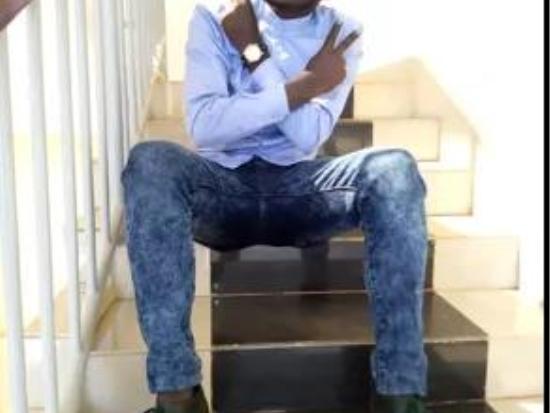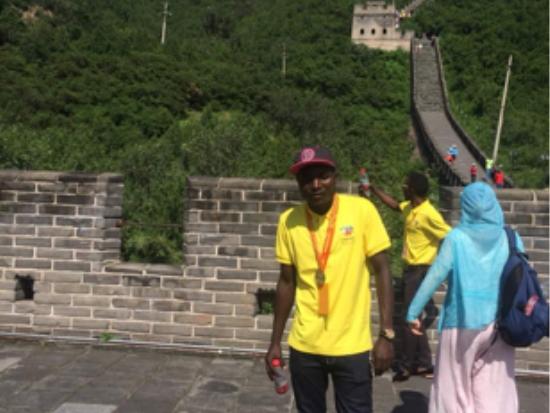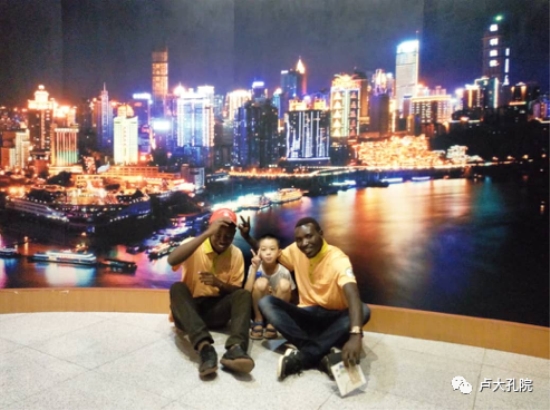Submitted by ciurce on
My Rwandan names are NIYONSENGA Aaron and my Chinese name is 杨伦(Yang Lun). I am a student in the University of Rwanda, College of Education, majoring in Englishwith Education, and I am to graduate this year in November 2020. I have studied Chinese for three years so far.
As a university student, I got a chance to find Chinese language and culture lessons available in my college. There is Confucius Institute. And doors are open for all students there, yet not all thestudents attended the lessons. Maybe mydream began to come true on the very day I had those opposite ideas that Chinese is difficult, no matter how you try. For me, there is nothing easy under the sky!
I remember my first day to attend a Chineseclass, (ha-ha-ha-ha-hah) it was very funny. I saw my teacher drawing zigzag lines on the whiteboard, andsurprisingly he told us that those ‘lines’ meant things we were familiar within our mother tongue. Fortunately, theteachers were good at English and so it was easy for us to understand theirexplanations. However, meeting some Chinese names of things with which I wasunfamiliar in a Rwandan environment became a great challenge to me. At first,when our teacher explained to me what a panda (熊猫;xiongmao) is, it was like playing a guitar for a cow. These are very famous and symbolic features of China. Getting a full command of their pronunciation and meanings was therefore a bigchallenge for me during the start. Nevertheless, I gradually came to understandthat this was the first step that is always difficult.
Thenceforth, I can’t really find felicitous words that would explain better how I came tolike Chinese language and culture. Whenever I sat in a classroom, studying Chinese, I saw hours runningvery fast and most of the times I wished the teacher would go on until thefollowing day! Whenever we sang the Chinese songs or played Taichi, I was suchmoved and I would lose myself into the act that I wished we could not stop it.The teachers’ motivation did a great work in my learning. Cheering me up withsmall rewards or handclaps whenever we submitted the home works or exercisespride and joy could overwhelm me, and just by looking at me you would think Iwas possessed by the Holy Ghost. Actually, this was because I was progressingin learning a language some of my fellows feared most.
Whereupon, I started working hard, doing self-studies, everyday attending class and participatingin other Chinese lesson programs like singing, playing Taichi and so on and soforth. When I had only learnt Chinese for six months, I did an HSK2 (Hanyu Shuiping Kaoshi: translated as Chinese Proficiency Test Level 2) andscored 181 marks over 200. It was a privilege for me to get these points in thefirst place in that it showed me that things we fear are possible andapproachable. As long as we work hard, with internal willingness and a clear-cutpurpose, we will undoubtedly achieve something strong, a surprise to our pastimaginations and future expectations. I went on studying hard that when I had studied Chinese for one year I did HSK3 and scored 266 marks over 300.Here, I was not very happyabout these marks because I had wished to get over 270 points. However, I never gave up. I unceasingly attended Chineselessons and culture exhibitions and my interest in them grew like dry bushburning in the dry season. It was a great surprise for me when my teacher toldme that the Confucius Institute had chosen me to attend the Summer Camp in China. I jumped and dashed about for elation and excitement. In addition, I am sure this attendance forthe Summer Camp in China must have opened channels for my success of HSK4,which I did right after coming from the camp, and in which I got 277 pointsover 300. Furthermore, the camp paved a way of my first attendance in ChineseBridge Competitions for the students of university. It annihilated all thefears that frequented me- the fears of competition. Thus, I attended 2019 Chinese Bridge Competition for students of the University of Rwanda, and although I did notwin the champion, I was amongst the finalists nevertheless. In addition, apartfrom the prize I was awarded, I was at the same time proud of my reaching thefinals at my first attendance of Chinese Bridge Competition. Altogether, I have already done an HSK5, in which I got 232 marks over 300.You may perhaps findthese marks to be lower, especially when you compare them to the ones I got inthe preceding tests, but I still consider them an outstanding success becauseit is true that the higher the level of a Chinese test, the harder it is. Now, I have already applied for a ChineseScholarship, and I hope that in September 2020 I will fly to China in an effortto ameliorate my learning Chinese and do my Master’s Degree.

Aaron in University of Rwanda, College of Education
All of us have dreams. However, not all of our dreams ever come true. In fact, somedo and others do not. I am one amongstthose whose dreams ever came true. I know that in your mind there is thisquestion: in what ways? But for sure, the answer is simple and funny yetimportant and understandable.
Before my journey to China , I had not visited more than two African countries; Rwanda my motherland which I visited since when I was born, and Congo which is a close neighbor of West Rwanda where my hometown is located. I had always wished to go far beyond the two countries I have mentioned and see what is happening there.Certainly, I was very curious about this. Even in my learning, in either middleschool or university I had this intention. And I cannot get convincing words to explain clearly to you how I felt when the luck to visit China was introduced to me. Perhaps you will get a picture of it in your mind if you too can remember something that pleased you most in yourlife. Do you recall how you reacted? Then you will understand me.
Our flight was scheduled and began on Thursday August 16th, 2018. It was about 5.pm when the airplane set off. Certainly, it was my first time to travel by an airplane. Few of my colleagues ever had. The flight passed in Addis Ababa(Ethiopia) where we changed the airplane and took a bigger one that directly took us to Beijing, China. The journey to Ethiopia took two hours. In Ethiopia, wewaited for the airplane until 12.00 am when the flight to Beijing started. Finally,we reached Beijing the next day on Friday August 17th, 2018. It was17:00 pm in Beijing and in Rwanda it was 11:00 am. As I have said earlier,talking about China’s privileges can take up a completely big book. Therefore, apart from the huge airport andspacious long buildings that I saw there, I can’t help talking briefly aboutsome of the beautiful and significant landscapes I visited; places thatimpressed me very much while I was in China.
Many of us have heard of “Great Wall”. As one mounts Great Wall difficultly with sweat all around the body, he shouldrecall the duties and responsibilities that he has to make in order for hislife to be better and enjoyable; he should aspire to the development of hisfamily, his country and his world as a whole. Importantly, Great Wall remindsyou that this will be accomplished through hardworking. Chinese people, afterhighlighting the importance of Great Wall, raised a saying that “Until you reach Great Wall,you are not a true man.” 不到城长非好汉。This signifies that youhave to overcome difficulties before reaching your goal.

Aaron reached the Great Wall, Beijing, 2018
Furthermore, I was very much impressed by my visit to the Forbidden City, Gugong (故宫). It is also called theImperial Palace. It was so-called‘Forbidden City’ because no one ever entered it freely as he wished. You wouldenter it only from the emperor’s consent. It is large and spacious with manybeautiful buildings built many years ago. Some of its inside buildings I recallare like The Gate of the Divine Prowess (Shen Wu Men) which is the northern gateof the Forbidden City. This was built during the Ming Dynasty in 1420 in theEighteenth year of Yongle Emperor’s reign. People initially called it the gateof Mysterious Warrior (Xuan Wu Men) after the ancient Chinese deity of theNorth. Then it was rebuilt during the Qing Dynasty, under the reign of KangxiEmperor. In 1661-1722, its name was changed and was renamed so (Shenwu Men) toavoid using the character Xuan that was a taboo as it was part of the KangxiEmperor’s birth name.
We left Beijing and directly headed for Chongqing 0n August 23rd, 2018.And it took only one hour by an airplane. In China, there are four big and famous cities. One is Beijing, which is the capital city of China, and you haveknown a lot about its beautiful and famous sceneries like the top BeijingUniversity, and other universities. The other is Chongqing, Shanghai, which is a commercial and financial city, and the fourth is Tianjin.
This is one of the biggest cities in China interms of areas and population. It has over 30 million of the inhabitants and itis the hottest city in China. In the past, before colonialism, Chongqing wasthe capital city of China. Chongqing is nicknamed four names, which I will useto shorten information about it. The first name is that it is a ‘mountainous city’ because of its manyhills and mountains. Secondly, it is a ‘bridged city’ with countless bridgesover ceaseless thrills of rivers like Changjiang, which is the largest river inChina, and other different waters. Third, it is a ‘large and broad city’ for its areas and inhabitants. Fourth,Chongqing is a ‘furnace city’ sinceit is hot everywhere and in a summer seasons it is burning like a stove. Inaddition to this, Chongqing is a misty city. It is the mistiest city in China.In all, Chongqing municipality has beauteous sceneries like Dazu, Qicikou,Baodi Shan, and so forth.

Chongqing Night View behind Aaron
We also visited Chengdu where we went to see pandas. As in Rwanda you know, wevalue and appreciate gorillas (Daxingxing) to great extent that they are like a symbol of our country. Chinatoo values and appreciates pandas (Xiongmao) very much. Panda is a kind of animal that has mixed features; like thecats’, especially when you carefully look at its head and a bear when youexamine its lower limbs. However, a panda is neither a cat nor a bear. Pandascan live for thirty or forty years in accordance with their preservation. Oncea panda begets twin-babies, the wild mother panda will only look after one babyand the other baby will undoubtedly die. On the contrary, pandas reared in zoosonce they give birth to twins, the mother panda take care of one baby and thepeople in charge look after the other baby.
It is true that we spent a week in Chongqing. Just as we have tasted Beijing food,we also tasted Chongqing food. I verymuch enjoyed the experience of using chopsticks. My favorite food in Chongqingis huoguo (火锅), a kind of spicy foodwith a lot of ingredients, and it is very famous in not only China but all overthe world that it is a unique specialty for China. I also enjoyed eatingnoodles (xiao mian) which was myeveryday breakfast.
Moreover, we had some Chinese language and culture studies. We practiced Kung Fu (gongfu) which should be used to bring and protect peace among thepeople and should not be misused. Also, we learnt the Chinese Calligraphy (Shufa) and the Paper-cutting (jian zhi) which is an outstandinghandcraft used in decorations. Thereafter, we held a closing ceremony where we danced and sang Rwandanand Chinese songs. Then, we heardfarewell speeches from the President of Chongqing Normal University and ourDirector Zhang Xian’s speech full of much gratitude towards the ChongqingNormal University, the Hanban, and the two countries; Rwanda and China ingeneral.
Frankly speaking, as I am looking forward to the arrival of a real time, I am very excited and determined to go back to China for further studies. I want to be an English, French, Kinyarwanda and Swahili teacher in China, and a Chinese teacher in Rwanda. My dream is to become a sturdy bridge that interconnects language and culture networks between Rwanda and China, as well as the whole globe. My intention is to find myself in every angle of the world serving as anagent of communication through language and cultural exchanges. It is in thisway I want to make communication easy by making people understand another evenif they might have different perspectives. I am very thankful for the collaboration and cooperation between Rwanda and China. I gratefully appreciate the recognition and welcome which Rwanda has provided to Confucius Institute. Finally, I thank all the leaders, contributors, volunteers, teachers and myfellow students for their unbreakable chain of affiliation and cooperation. I believe that the bond between the two countries will be everlasting and inseparable, as well.
作者简介:杨伦,卢旺达大学教育学院学生,目前大四,2017届孔子学院学员。
